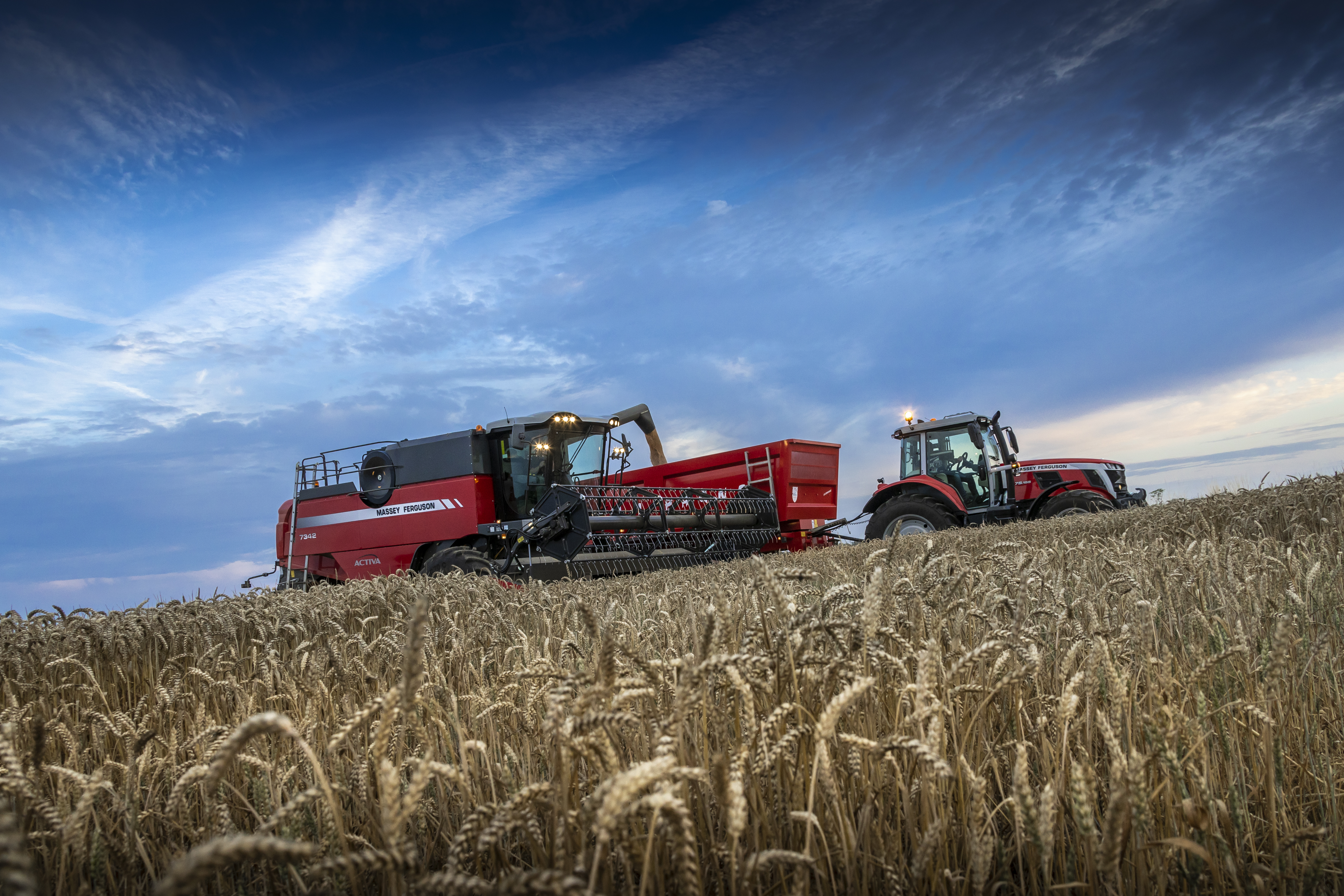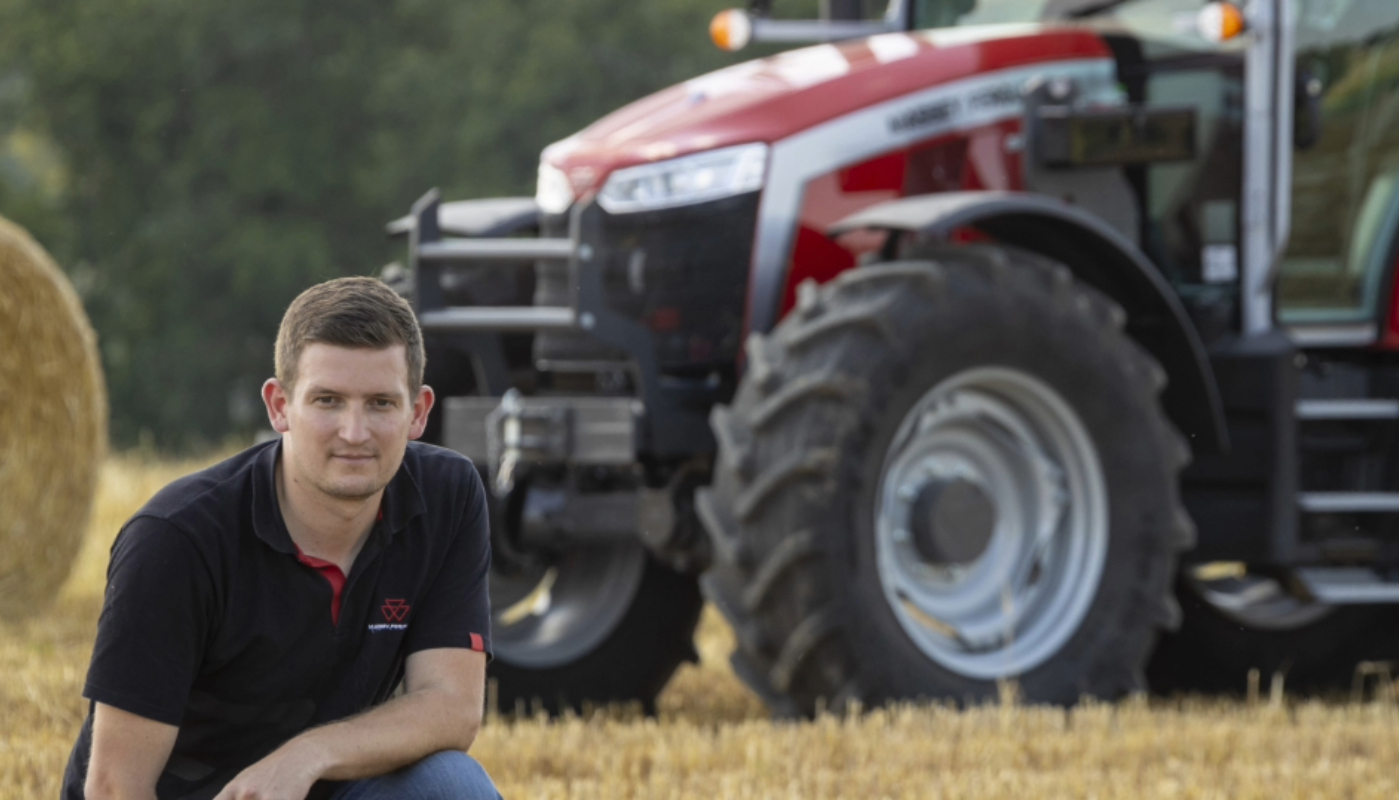Steve Cobb has the title of the Sunbelt Expo Farmer of the Year, but he says the award goes to his family.
Story by Jamie Cole
It’s a summer morning at Cobb Farms, and Steve Cobb is holding court. With an audience of family, farm equipment dealers and journalists on hand for a farm visit, Cobb weaves stories from almost seven decades on the farm that educate and fascinate … and he doesn’t mind a little sermonizing, either:
“The Book of Psalms says, ‘A man's time is three score and ten,’” he says to the assembled group. “When you put the old mathematics to that and you add that up to be 70 and you get like me and you're about 14 months away from being 70 years old, you start to understand… Life is here for a time, and it ends, and then it's continued on by others. The others are those people that you raise and you love and you work with every day.”
Many of those “others” are in the room: Son Aaron, who works with Steve on the family’s show pig business. Son-in-law Erick Lyerly, who runs the family’s row crop operation and Cane Island Produce, an on-farm country store. And daughter Leslie, who runs the farm office. Darin Owens, a long-time employee and now a partner, is out working; “he does a little bit of everything… he’s extended family,” says Steve.
Leslie can’t hide her emotion when she talks about her dad, her mom, her siblings and her kids all working together. “There are no words to describe what it’s like to work with my family on the farm,” she says, but recently, when she entered Cobb Farms in the county’s Farm Family of the Year program, she had to come up with quite a few words, both for the application process, and to convince her father to do it.
“My dad is a private person,” she says, “and very humble.” When Steve talks about the program, he says he liked that the local award was for a “farm family,” and had “no idea” they’d eventually advance to win the statewide award, and then the venerable Southeastern Farmer of the Year, presented each year at Sunbelt Ag Expo in Moultrie, Georgia.
But that’s exactly what happened.
“Getting him to do it was a challenge,” laughs Leslie, but this is a family familiar with challenge, professional and personal.
In Steve’s mind, he is still the son of subsistence farmers, on some of the same land where his family raised its own food to survive in northeastern Arkansas’ Craighead County. “We grew a garden to eat. We raised pigs to eat. We milked our own cows… just a very old school farm life,” he remembers. He says his parents wouldn’t recognize what the farm—and farming in general—became: a 4,500 acre operation that grows cotton, corn and peanuts; has a popular farm-to-table produce store; and raises some of the most prized show pigs in the industry.
All from a 40 acre share “given to my mother by her father,” says Steve. “How much I would love to take my mother and father and put them in a pickup truck and take them around the homeplace… show them what it looks like today,” he says.
Steve says the farm did begin to commercialize in the mid 1960s, when his older brother returned to the farm and helped expand the row crop and hog operations. But professional challenges, especially in the commercial pork industry, were make-or-break.
“My dad had commercial pigs, and he bought me my first two Yorkshires when I was 13 years old, in 1970,” says Steve. “The first half or more of my career, I was a purebred pedigree Yorkshire breeder. And my main focus and emphasis was raising breeding stock for commercial swine producers that was raising pork or on the elite end for other Yorkshire breeders.”

There might be no “second half” of his career without his own son, Aaron, stepping up, he says. “What seems like overnight, when you compare it to long term, the commercial pork production in this country ceased being raised by independent family farmers and became a corporate large scale production business.” That was the late 1990s, when Aaron was a high school sophomore. “He said, ‘Dad, I don't want to sell the pigs. Please don't. I want to raise show pigs.’ I always jokingly say that there's probably no less than 50 reasons that I gave him that that would not work.
“And obviously I was wrong on all 50 reasons and because some, almost 25 years now later, we're still successfully raising show pigs.”
Not just any show pigs, but some of the industry’s most valued. “If you're good at raising the show pigs, it adds value to your animals to be purchased by other breeders as boar studs, foundation females, breeding stock,” he says. While that forms one prong of their pig business, the heart and soul is the “midline pig” that’s going to be shown by youngsters shows and fairs across the country.
“We're barely in the pig business at all,” says Steve. “We're in the education business, the hobby business, the entertainment business… We're in the family business. And so it's fascinating from the number of people that we get to meet that we know from all over the country, at the different levels of competition.”
Steve says he and Aaron took a high-risk, high-reward step with the show pigs, but that the steady business over time has been the row crops. “Cotton is still king here,” says Erick Lyerly, who describes his role at Cobb Farms as a “day-to-day” manager of the row crop and produce sides of the business. “I think that for every farm in Northeast Arkansas, cotton is the cornerstone. Peanuts are a very good rotational crop, and your cotton’s better behind it. We also grow non-GMO corn, and that is kind of new in this area in the past 10 years.”
Cane Island Produce is the newest venture, and was started as an over-winter business.
“We were just going to do a greenhouse—something to grow in the winter, and then ship tomatoes out,” says Erick. “We never did ship the first tomato out. Everything sold right here in the store. And then once you had the tomatoes, people start asking for other things. So that's kind of how it's evolved.”
Erick says he enjoys welcoming visitors to the farm, and says he has to discipline himself “when we’re busy in the fields to stay away from the farm store, because I’ll get to talking too much,” he laughs. “I like talking to people.”
So does Steve, especially for a “private person,” as his daughter described him. He doesn’t even mind sharing some personal challenges, as long as he can bring the lesson back around to the importance of family. As the day winds down, Steve relates the story of Scout, Leslie’s daughter, who was diagnosed with stage four neuroblastoma as a toddler.
“In our Farm Family of the Year application, they asked us: ‘What's the most challenging thing our family has ever faced?’” says Leslie. “And we have faced lots of challenging things. The commercial pig business—we were going out of business with that. We had a hailstorm in 2014 that took out majority of our cotton crop. In 2018, our peanut crop got flooded out. We couldn't get it out. So lots of challenging things. Nothing was as challenging as having a child with a 20% chance to live.”
As Steve tells it, “A family friend said to me, ‘Look at it this way, Steve. This will make your family closer.’ And I looked at him and I said, ‘You don’t understand. This family couldn’t get any closer.’”
Scout is 15 now, a survivor. Seven other grandchildren are “always running around the farm,” says Steve, “they’re all within five minutes of here.”
Grandson Cruz, all of 11 years old, helped Steve select the prize from Massey Ferguson for winning Southeastern Farmer of the Year: Use of a tractor for one year. “The next thing I knew, that Massey Ferguson 4710 was sitting on the lot,” says Steve. “‘It’s just the right size, Papa,’ is what Cruz told me,” says Steve.
The real prize, though, is getting to farm with his family, says Steve. “The greatest reward of my life,” he says. “All of the kids enjoyed him being Farmer of the Year because we wanted Dad to have that recognition,” says Leslie. “He deserved it. My mom, Terri, deserved it. I mean, we are who we are… we are a farm family because of them.”

Steve admits there were times during the process of advancing in the Farmer of the Year program that he wanted to “graciously withdraw,” he laughs. And he adds that with the award presentation being “right in the middle of peanut and cotton harvest, I couldn’t take the whole family with me. I wanted ’em all up there on stage with me,” he smiles.
Even if the whole family wasn’t on the Expo stage, he says he and Terri were proud to represent them all, and that the family being close and active makes him excited about the future. “They have that passion and that desire, I see the future for that being endless,” he says of his kids and grandkids. “And I am absolutely certain that there are things on the horizon that have never crossed my mind yet as well.”
As Steve said at the start of the day: Life is here for a time, and it ends, and then it's continued on by others.























Share